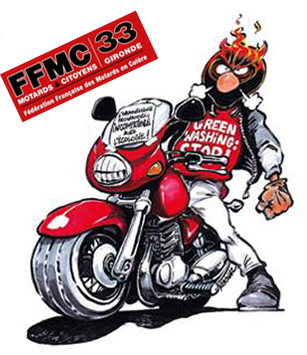 France – Overall there doesn’t seem to be much happening in our corner of the motorcycling world. That is apart from today’s national demonstration – 1st October 2016 – organised by the French riders group FFMC – Fédération des Motards en Colère (1) regarding emission free zones (circulation restreinte) and the “banning” and fining of motorcycles and other vehicles that do not meet emission standards.
France – Overall there doesn’t seem to be much happening in our corner of the motorcycling world. That is apart from today’s national demonstration – 1st October 2016 – organised by the French riders group FFMC – Fédération des Motards en Colère (1) regarding emission free zones (circulation restreinte) and the “banning” and fining of motorcycles and other vehicles that do not meet emission standards.
In Paris where this has already been introduced, these vehicles are banned between the hours of 8am and 8pm during weekdays – pre-1997 vehicles and motorbikes before 1st June 1999, or rather those vehicles that do not meet European Emissions standards – Euro2. France is under threat of fines by the European Commission for non-compliance with a European Directive on air quality and perhaps a political vision of making the streets nice and “friendly” with bicycles and pedestrians only.
Further restrictions are planned from 2020 – only vehicles registered after 2011 will be allowed to travel in the emission restricted zone, all others banned on weekends and evenings – technically only vehicles that meet Euro5 and Euro6 standards.
Motorcycles And Euro Emissions
The motorcycle industry is playing “catch-up” on emission standards – the Euro5 regulation is set for introduction around 2020 and Euro 4 from 2017. Mopeds and quadricycles will continue to be at Euro 3 levels until 2017.
The 2020 introduction of the Euro5 emissions standards is via the European Commission’s – Motorcycle Working Group (MCWG) – and the World Forum for Harmonization of Vehicle Regulations (WP 29) UNECE and includes looking at:
Maintaining engine performance
Misfire detection
Sound quality – sound levels – noise emission standards
Minimizing add-on cost
On-board diagnostic systems
Cost benefit
Feasibility aspects
Catalyst monitoring
World Motorcycle Test Cycle (WMTC) – as an alternative under current emissions regulations
According to ACEM (L’Association des constructeurs européens de motocycles), moving from EURO 3 to EURO 5 will reduce overall motorcycle emissions by around 50 percent. Stating that EURO 5 standards for motorcycles would match those of passenger cars with these new proposals covering the motorcycle industry through 2020, at which point they presume that even more stringent regulations would be drafted.
London
London at present has a Congestion free zone, which does not charge (Powered Two Wheelers – PTW – motorcycles – scooters – mopeds) the city has a Low Emission Zone (LEZ) which is over the same area as the Congestion free zone in which cars or motorcycles do not have to pay.
However from September 2020, all cars, motorcycles, vans, minibuses, buses, coaches and heavy goods vehicles (HGVs) will need to meet exhaust emission standards (ULEZ standards), or pay a daily charge, £12 per day when travelling in central London.
Therefore unlike Paris and other French cities applying to introduce emission zones, motorcyclists if they can afford it can pay. There is no outright ban and there is an historic vehicle exemption if built before 1 January 1976.
Back In France…
Other French cities/towns that are listed as considering introducing restrictions of freedom of movement of vehicles are Reims, Strasbourg, Grenoble, Lyon, Saint-Etienne, Dijon, Montpellier, Toulouse, Arras, Dunkirk, Lille, Rouen, Avignon, Cannes, Clermont-Ferrand …including Bordeaux which is down the road from us.
Earlier this year the Ligue de Défense des Motards (LDM) threatened to block the start of the Euro 2016 football tournament in June and FFMC along with others have organised previous demonstrations.
Other smaller communities are considering restrictions which amount from what we have read to around 735 municipalities across France.
Why The Ban?
Motorcyclists and motorcycle organisations have always argued and promoted how the PTW is the best of all worlds as an everyday method of personalised motorised transportation:
Smaller, lighter and very well adapted to the challenges of urban traffic
Commuter solution
Congestion busting
An affordable transport solution for the young – providing access to work
Cutting the length of journey times to work.
An economic alternative to a car
Environmentally friendly transport – reducing air pollutant emissions
How the last two “claims” in terms of the environment that motorcycles of all sorts were cleaner is where issues arises, including a rhetorical debate started back at least ten years ago that motorcycles should be mainstreamed and integrated into national and European core transport policies.
In that respect, we may have got what we wanted to a certain extent, but now it looks like we are having to pay the piper for being a congestion busting solution for urban commuting and mobility.
It is not that motorcycles are being targeted per se in the environmentally/green/emission friendly world we now are trying to live in, which is being modelled by Governments – Scientist – Environmentalists – in an attempt to reduce emissions from vehicles and hence to improve our quality of life.
However as the motorcycles industry attempts to produce cleaner motorcycles and prove that they are as clean as other emission friendly vehicles, we as motorcyclists are being given the same treatment as other older more polluting vehicles and included in the same “mainstreaming” policies that we asked to be included in.
Already in Paris the Mayor has announced the postponement of further bans of pre-1997 cars and motorcycles before 1999 until 1st January 2017, this should have come into force today (October 1st).
“We must be careful: this is not an educational decision as announced by the City, and this is not the removal of the ban,” says Jean-Marc Belotti, coordinator of the FFMC Paris Petite-Couronne.” A representative of the Mayor said, “We want to give more time for motorists to find alternative means of transport and the city’s aid. “ Source MotoMag.com – via Google Translate
Somewhere, we found this definition of a road, “a route which all persons, rich or poor, can use to pass and re-pass as often and wherever they wish without let, hindrance or charge” I think we have now moved beyond that definition.
As one commentator put it … personally I think the environmental friendly issue is lost… but that does not mean we give up and forget all the advantages of Powered Two Wheelers of whatever age or persons that need and use an “affordable” means of personalised transport.
Original Sources – Information
Passion Moto Securite – Update on: traffic bans against motorcycles – Via Google Translate
Passion Moto Securite – The two-wheelers, pollutant or not? – Via Google Translate
Euro 5 study – ACEM concerns and priorities – pdf
1. Other rider groups exist in France too – La Ligue de Défense des Motards (LDM) – Fédération des Bikers de France


HB asks: “Why do we not see the data published in mainstream motorcycle magazines”? Possibly because it makes for uncomfortable reading?
Pictures from the demo.
France – FFMC 33 – Emissions Demo – Bordeaux – October 2016
View on SmugMug
We motorcyclists are–for whatever reasons–given to expecting to have our cake intact, while eating it. Motorcyclists expect to use public roadways and be given the same respect as drivers of other vehicles–but we also expect to cheat the science. It’s like the motorcycle driver who expects to exceed the speed laws, but then expects the law to protect him/her from errant drivers, or recover a stolen bike.
Society is changing from a world of relative driving freedom to a world where traffic has to fit within a carefully crafted plan. Other transportation modes have long ago made this switch, for example marine traffic into harbors; aircraft traffic into airports; pollution limits for motor vehicles. Motorcyclists seem to be living in the past, and extremely reluctant to move into the future of transportation. The motorcycle industry doesn’t seem to comprehend what the future of motorcycling might look like.
If we motorcyclists expect society and international organizations to give us respect, we need to take responsibility and be brutally honest about what’s happening. IMHO we must do scientifically correct research, and live with what the research uncovers–rather than scurrying around attempting to find research that justifies our opinions. If we’re only looking for justification for what we want to do–regardless of the effect on society–we must expect some dramatic changes to our lifestyles.
Mile for mile (or Kilometer for kilometer) how do motorcycles compare to passenger vehicles in terms of fuel mileage, exhaust contaminants, noise, affect on traffic flow, seat occupancy, parking requirements, end of vehicle life considerations, and cost to society for medical care, fatalities, etc.? Who has the data? Why do we not see the data published in mainstream motorcycle magazines?